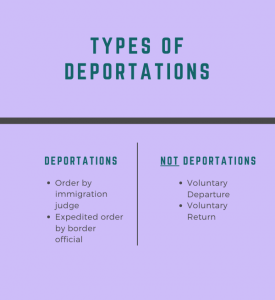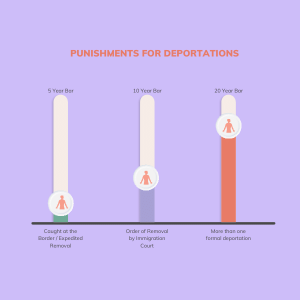Can a Deported Person Come Back Legally?
If you have been deported from the United States, you may worry, “Can a deported person come back legally?” Others return illegally to the U.S. after a removal and wonder, “I was deported and returned illegally; can I fix?” This article answers whether you can fix your papers after deportation.
You can fix your papers, even after a deportation. But how to fix, and when, will depend on many factors. Below, we start by exploring the various types of deportations. We answer, “What is a deportation?” and “What kinds of deportation are there?” (Note: A voluntary departure or voluntary return is technically different than a deportation.). Next we cover how various types of deportation can affect your ability to fix papers or get a visa. Finally, we discuss how you can fix your papers, even after deportation.
Types of Deportation
What is a deportation order?
A deportation order is an order to physically remove a person from the United States. Several agencies have the power to deport a person. An immigration judge can do it, as well as border officials at Customs and Border Protection.
A deportation order is different than an order to voluntarily depart the United States. And a voluntary departure is different than a voluntary return. It is important to know the difference between all of these, because they each have unique immigration consequences.
Types of “deportation”
We put “deportation” in quotation marks, because some things look like deportations but are not.

1. Order by an immigration judge in immigration court
Immigration judges in immigration court can give a person a formal deportation order. Before they do, judges must decide if a person can legally stay in the U.S. Also, they decide whether to grant the non-citizen an application for relief. If the non-citizen loses, the immigration judge can issue a deportation order. Almost always, the non-citizen can appeal. During the appeal, authorities cannot deport the person. However, once the appeal is los, ICE can remove the person from the United States.
2. Order of voluntary departure by an immigration judge
An immigration judge can also grant voluntary departure. This is not a deportation order. It is an order to voluntarily depart the United States within a fixed time. If the judge grants it before the case is over, the person has 120 days to leave. If granted after, he or she has 60 days.
The difference between a removal order and a voluntary departure is key. Removal orders result in a 10-year bar to returning to the U.S. By contrast, voluntary departures don’t trigger a bar. But what happens when a person gets voluntary departure and doesn’t leave? Then he or she can’t get most types of immigration benefits for 10 years.
3. Expedited order of deportation by a border official
Generally, a border official can arrest and deport a person in this situation:
- the person enters the United States illegally
- the person is caught within 100 miles of the U.S.-Mexico border
- the person is caught within 14 days of crossing into the U.S.
In this situation, the border official can order the person deported without a court hearing. It happens fast, which is why it’s called “expedited removal.”
Over the years, millions of illegal entrants were deported in this way. In 2021, border patrol encountered 1.6 million people and many were deported by border officials. The most common origin country for illegal border crossers was Mexico. Most others came from Honduras, Guatemala, and El Salvador.
An expedited order results in a 5-year bar to returning to the United States.
4. Voluntary Return
A voluntary return looks like a deportation but isn’t. Only border officials and ICE officers can grant voluntary return. It happens where the non-citizen consents to going back to his home country without seeing an immigration judge. After the immigrant consents, the government will return the person to his or her country.
Usually, a voluntary returns happens in two situations:
- An undocumented person is caught in the U.S. after arrest for a crime. ICE offers a voluntary return instead of putting the person in deportation proceedings. He or she agrees to go back. ICE takes them there.
- A person crosses the border illegally. In the past, border officials would allow Mexican nationals to voluntarily return, even after they had attempted to cross several times.
Be careful not to blindly assume that you got a voluntary return. Sometimes, an ICE officer would have a person sign a “stipulated order of removal.” Then the ICE officer would send it to an immigration judge. Finally, judge would issue a deportation order. Thus, unwittingly, the undocumented person would have signed for a formal deportation order without knowing it.
Next, we will learn about how each type of deportation will affect how and when you are able to fix your papers.
How Deportation Affects Your Ability to Fix Your Papers
If you get a deportation order, you have to spend a certain amount of time outside the U.S. before you can legally reenter. This is called a “bar.” Hispanic immigrants popularly refer to these bars or penalties as a castigo de 10 años, or castigo de 5 años.
How long is the bar? (i.e. length of castigo)
Here’s how to know how long you have to wait:
- Specifically, if an immigration judge gave you a deportation order, you have to spend 10 years outside the United States. (You can still get a pardon, as discussed in the next section.)
- If a border official gives you a deportation order after catching you near the border, you have to spend 5 years outside of the U.S. (For pardon options, see the next section.)
- If you have been removed more than once, you have to wait 20 years outside of the U.S.

Which Types of Deportation Result in Bars?
Remember, not every type of deportation will result in a penalty, for which you have to wait in your home country.
Only the following types of deportations result in a penalty:
- Orders by an immigration judge in an immigration court proceeding
- Orders by a border official after apprehension at or near a border crossing
- Reinstatement orders, which you get if you are ordered deported, you illegally reenter the U.S., and you are caught again
But the following do not result in an automatic bar:
- Orders of voluntary departure by an immigration judge
- Voluntary returns by immigration enforcement officials
- Self-deportations
But do I have to wait outside the U.S. the entire time?
Sometimes, you can come back legally without waiting the entire length of the bar, or castigo.
For example, suppose you get a 5- or 10- year bar, and you wish to immigrate through marriage to a U.S. citizen or resident spouse. You can apply for a pardon using a Form I-212. The Form I-212 is titled, “Application for Permission to Reapply for Admission into the United States After Deportation or Removal.” If the U.S. government grants it, you can come back before your “punishment” or “sentence” is over.
What if I got a deportation order and haven’t left?
If after getting a deportation order you never leave the U.S., the bar does not apply to you. You get “sentenced” or “punished” only if you depart the United States. So if you are in the U.S. and you have a deportation order, talk to an immigration attorney. The attorney can explain how to reopen your deportation order and possibly terminate the case.
Pardons for Persons Deported from U.S.
As discussed above, deportees can get a pardon.
Who can immediately apply for a pardon?
Some deported persons can apply for a pardon without having to wait for the 5- or 10-year bar to expire. This is great news for some people who were here illegally, but are married to a U.S. citizen or resident.
You can apply immediately in these situations:
- you were in the U.S. illegally only one time and since then never illegally reentered or tried to reenter illegally, or
- you were in the U.S. illegally for less than a year and illegally reentered
You will have to wait several years outside of the U.S. to apply for a pardon in these situations:
- you were in the U.S. illegally for more than a year and since then you illegally reentered or tried to reenter illegally, or
- after getting a deportation order, you reenter illegally or tried to reenter illegally
How to apply for a pardon for deportation
To get a pardon for deportation, you will need to send in a Form I-212. You need to attach evidence on why the good factors in your case outweigh the bad ones.
Here are some examples of things that will show you deserve a pardon:
- length of residence in the U.S.
- family ties in the U.S.
- hardship to U.S. citizen and resident relatives
- rehabilitation from criminal past
- evidence of respect for law and order and good moral character
We recommend that you get an experienced immigration lawyer to help you submit the waiver.
Caution: Requesting a pardon may be a waste of time if you don’t qualify for a papers anyways
Seeking a pardon for a deportation can also waste of time and money. If you aren’t eligible to fix your papers anyway, then the pardon for deportation will be useless.
Here are some reasons why you may not be able to fix:
- Criminal history. If you have violent or dangerous convictions, or even minor drug convictions, there is a strong likelihood that you cannot fix your papers. Criminal pardons are sometimes available, but these are very limited.
- Illegal reentries. As discussed above, if you have prior illegal reentries you will have to wait a full 10 years to apply for a pardon of the deportation.
- Fraud. Sometimes deported persons may also have lied or misrepresented something to an immigration official. Sometimes you can get a fraud waiver for this.
- False claims to citizenship. If you falsely claimed to be a U.S. citizen, it is nearly impossible to fix your papers.
- Missed hearings. Let’s say you skipped your immigration court hearing in the U.S. You have a 5 year bar for which there’s no pardon.
Bottom line: Consult with an experienced immigration lawyer to find out if it’s worth your time and money to apply for a deportation pardon.
Frequently Asked Questions
What if I was deported and returned illegally?
If you got a deportation order and came back illegally, you have bigger problems. You are subject to the “permanent bar.” The good news: it’s not really permanent. You will have to wait outside the U.S. for 10 years, but then you can apply for an I-212 waiver.
They gave me voluntary departure and I didn’t leave. Can I fix?
Yes, but it’s difficult. Because you never left, your voluntary departure turned into a deportation order. So unless you reopen your case, you’ll probably have to leave the U.S. in order to fix your papers. Also, because you failed to leave, there’s a 10-year bar on applying for many immigration benefits in the U.S. If you can wait it out for 10 years, you have may have some options.
Conclusion
Can a deported person come back legally? It turns out you can, but the process is more difficult. If you’ve been deported, start by learning what sort of “punishment” you were given. 10 years? 5 years? Then find out if you qualify for a pardon, and whether it’s worth your time to apply.
If you take the time to learn more, you can fix your papers even though you’ve been deported.



